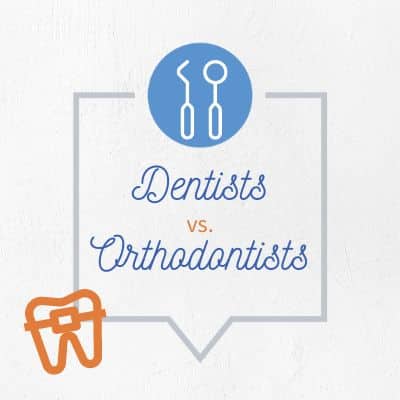When it comes to caring for your teeth, you’ve probably been going to a dentist for years. If you start seeing an orthodontist, you might think you no longer need to see a dentist. After all, you’re sitting in a chair, and someone is taking care of your teeth—does it matter whether that person is a dentist or an orthodontist?
It does matter. These professionals have different purposes when it comes to caring for your teeth, so one cannot replace the other.
What’s the Difference Between Dentists and Orthodontists?
Dentists and orthodontists both go to a four-year dental school, so all orthodontists are technically dentists—but not all dentists are orthodontists. Some dental school graduates go on to study a specialty for another two years or more; orthodontics is one such specialty. Completing that specialty program and exam earns them the title of “orthodontist.”
While some dentists may offer aligners, for example, that doesn’t make them orthodontists. Orthodontists take those extra years of study to become experts in the art and science of straightening teeth, fixing overbites and underbites, and correcting other issues with the jaw. Orthodontists are responsible for correcting misaligned teeth, and, after examining your mouth, they will design an orthodontic treatment plan that’s right for you.
Dentists focus on general oral health. You visit your dentist for regular cleanings and check-ups, and dentists are able to fill cavities, extract teeth, treat gum disease, and place crowns. They can also identify issues with your jaw or teeth that may require a specialist; at that point, he or she may refer you to an orthodontist. You can also take the initiative to visit an orthodontist on your own if you have concerns about your smile or your child’s smile.
When you’re wearing braces, good oral hygiene is still important—so you need your dentist now more than ever.
Why You Need Them Both
Regular dental cleanings and check-ups are important for removing plaque and identifying tooth decay before it gets worse. That doesn’t stop when you’re seeing an orthodontist! Orthodontic treatment plans can last for years; you definitely don’t want to be skipping dental appointments for that long.
That’s especially true when you consider that braces can make it more challenging to care for your teeth. Braces create more places for food to get stuck, which can lead to decay. They can also contribute to the demineralization of your teeth and leave permanent stains when removed. Your orthodontist will offer guidelines for proper brushing and flossing while you have your braces, but dental check-ups remain essential. Like always, your dentist will be able to spot small cavities before they become large, and the professional cleanings will keep your mouth healthier.
Having major dental issues during orthodontic treatment can delay your progress. For example, if tooth decay gets so bad that it requires a crown, the orthodontist may have to remove your brackets while you get the crown. If you have gum disease, you might not be able to get braces at all; if gum disease develops during orthodontic treatment, orthodontics may be ineffective. That’s a big waste of time and money, so it pays to keep your mouth healthy throughout your orthodontic program.
Your dental cleanings may last a little bit longer as your hygienist works around each bracket. Otherwise, your visit will seem pretty normal!
In some cases, you may need to visit your dentist more often when you’re going through orthodontic treatment. Think of your orthodontist and dentist as your oral care team, and maintain your appointments with both of them.
We would be honored if you chose Joosse Family Orthodontics for your orthodontic treatment. We would love to help you achieve your dream smile and refer you to incredible dentists who will help keep your smile healthy and bright. Call our office at (757) 229-4181 or contact us online.

